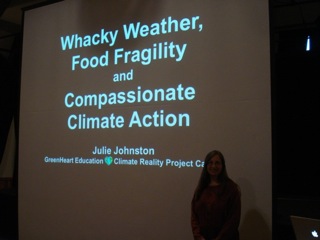Okay, I'll admit that my nerves are
somewhat frayed from a busy week at work and the radiating pain of a pinched
nerve in my neck. I might be feeling a little less compassionate and a lot more
cynical this week. (Is it just me or do dastardly events pop up in the Middle
East region whenever the American president's ratings dip or there's a
presidential election coming up? Grrr.)
So this week, I would like to simply ask
this. Can we not just get on with the critical transformation we have to make
to the Golden Age of Solar and other perpetual energy technologies? Just in the
last couple of days, I've received listserve messages that I'm sure have
contributed to the pain in my neck! Let me give you a few examples:
"Activists on all sides of the
argument can, and do, try to influence the political process. Problems start to
arise when scientists jump from saying 'this is how things stand' to 'therefore
you should do this.' As soon as they make that jump, they have entered the
political process and are expressing a political opinion NOT a scientific
one."
WHAT? Scientists who see and can
understand what we're doing to the atmosphere and the biosphere (not many of us
can actually grasp the processes at work in global warming and climate change) aren't
being scientific when they beg, "STOP PUMPING OUT SO MUCH GREENHOUSE
GAS"? So it's scientific to understand life, but not scientific to want to
safeguard it?
As it is, there aren't enough scientists
with guts and holistic vision speaking out at all. To then accuse scientists of
being unscientific if they make the logical leap, well, I think we'd better
figure out what our priority is.
This commenter continued:
"Using a national survey, [So and So]
has found that, among low-income and low-education respondents, climate
scientists suffered damage to their trustworthiness and credibility when they
veered from describing science into calling viewers to ask the government to
halt global warming. And not only did trust in the messenger fall – even the
viewers' belief in the reality of human-caused warming dropped steeply."
I think we'd also find that a lot of
"low-income and low-education respondents" are still smoking and
don't like wearing their seat belts. Why can't people see that this doesn't
matter? Governments should be going ahead and creating the necessary
transformation no matter who's on board, no matter who trusts which scientists,
and no matter who believes what.
Every day that we spew another 90 billion
tons of greenhouse gases into the long-suffering atmosphere is another day that
we're heading in the wrong direction. We can't take those 90 billion tons back!
And 20% of that carbon dioxide will still be in the atmosphere 1,000 years from
now. So quibbling and squabbling over whether scientists should have an opinion
on what to do, oh my gawd! Can we all grow up now please and get on with the
transformation?
This line (same commenter) cracked me up:
"At this year's [Such and Such]
meeting, the President's address lamented the falling trust in science. If
true, that would indeed be a sad state of affairs that society can ill-afford.
However, scientists need to reflect as to how much of their own behavior
in conflating science with politics may drive that decreasing
trust."
What? Falling trust in science is
lamentable? No! Falling ability to survive on this planet is lamentable! A sad
state of affairs? Can we get our priorities right, puhleeze? A sad state of
affairs is the drought that gripped the bread basket agricultural areas of the
world this summer! And blaming scientists? Listen, if science shares the blame,
it's only because science combined with technology had a hand in getting us
into this mess in the first place. The fact that some scientists are trying to
make up for this is a good thing, not something to bemoan.
Another commenter (same listserve,
different topic) explained that "psychodynamically rooted perspectives
concerning the management of anxiety" are equally compelling when it comes
to looking at why people do or don't change their behaviour. I'm thinking that
governments switching more than $1,000,000,000 (that's $1 billion plus) per
year in direct and indirect subsidies that they give to fossil fuel
corporations over to new perpetual energy companies – that would be compelling!
Talk about behaviour change. Investors like to back a winning horse – and guess
who would then have a chance at winning!
This person (a professor) continued:
"What I find is that students consistently are powerfully moved, motivated
and impacted by any writings that bring into the frame emotional dimensions –
that includes unconscious management of acute anxieties."
Just wait. They are definitely going to be
moved, motivated and impacted by the climate change emergency! Think you're
seeing "acute anxieties" now? Just wait till the Arctic summer sea
ice – the Northern Hemisphere's air conditioner during our growing season –
collapses completely if you want to deal with acute anxieties.
I don't know. Is it just me, or is there a
lot of talking about bullshit stuff that just DOES NOT MATTER in the face of
the climate change emergency? Why are we still sitting around talking
about fire safety regulations while the Earth is burning?
Okay, okay, I'll go take a painkiller and
a hot bath and see if I can shake my grumpiness. And maybe I should unsubscribe
from that listserve for the sake of my blood pressure. But truly, folks, we
need to make the swift transformation to the perpetual energy (renewable minus
burning) economy yesterday! What is
the hold up?








